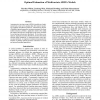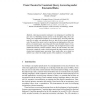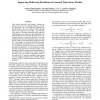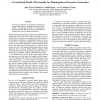63
Voted
AAAI
2015
9 years 9 months ago
2015
Autoregressive moving average (ARMA) models are a fundamental tool in time series analysis that offer intuitive modeling capability and efficient predictors. Unfortunately, the l...
63
Voted
AAAI
2015
9 years 9 months ago
2015
Querying inconsistent ontologies is an intriguing new problem that gave rise to a flourishing research activity in the description logic (DL) community. The computational complexi...
70
Voted
AAAI
2015
9 years 9 months ago
2015
Most typical statistical and machine learning approaches to time series modeling optimize a singlestep prediction error. In multiple-step simulation, the learned model is iterativ...
61
Voted
AAAI
2015
9 years 9 months ago
2015
We present an approach to incorporate interesting and compelling characters in planning-based narrative generation. The approach is based on a computational model that utilizes ch...
58
Voted
AAAI
2015
9 years 9 months ago
2015
81
Voted
AAAI
2015
9 years 9 months ago
2015
The expressive power of a Gaussian process (GP) model comes at a cost of poor scalability in the data size. To improve its scalability, this paper presents a low-rank-cum-Markov a...
62
Voted
AAAI
2015
9 years 9 months ago
2015
Covariate shift correction allows one to perform inference even when the distribution of the covariates on the training set does not match those on the test set. This is achieved ...
AAAI
2015
9 years 9 months ago
2015
Markov Decision Problems, MDPs offer an effective mechanism for planning under uncertainty. However, due to unavoidable uncertainty over models, it is difficult to obtain an exac...
65
Voted
AAAI
2015
9 years 9 months ago
2015
We study a game with strategic vendors (the agents) who own multiple items and a single buyer with a submodular valuation function. The goal of the vendors is to maximize their re...
AAAI
2015
9 years 9 months ago
2015
Learning probabilistic predictive models that are well calibrated is critical for many prediction and decision-making tasks in artificial intelligence. In this paper we present a...




